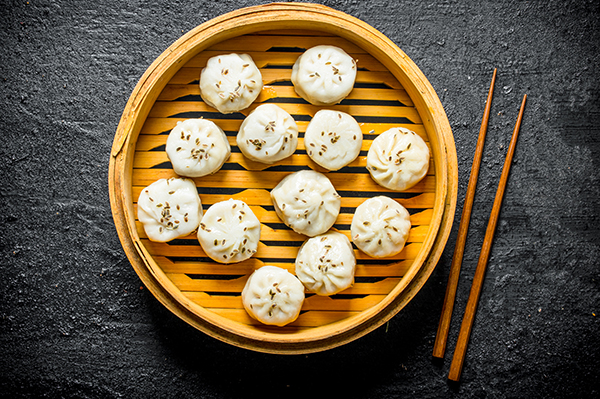
With May being Asian American and Pacific Islander (AAPI) Heritage Month, families across the nation will be celebrating the rich cultural tapestry of the AAPI community. One way to participate with your family is to learn about dim sum, which not only offers a culinary experience, but a journey into the heart of Asian culture and community.
First, what is dim sum? Dim sum is a cherished tradition in Cantonese cuisine, consisting of foods served on small plates. In translation, dim sum means touch the heart. Here are some of my favorite ways to dive in to dim sum culture.
Have a family feast. Gather loved ones for a delightful dim sum feast at a local restaurant (see suggestions below) or eat a dim sum meal at home by trying a variety of pre-made foods and frozen dumplings from your neighborhood Asian market.
Learn about dim sum culture. Educate your family about the rich history and cultural significance of dim sum. Share stories about its origins in tea houses, the etiquette of sharing dishes, and the symbolism behind popular dim sum foods.
Read picture books about AAPI culture, or written by an AAPI author. Take time to learn about different cultures together. Exploring traditions, cuisines or fun facts is a memorable, fun and educational experience. Consider reading Asian Adventures Delicious Foods A-Z with your kids. Get more kid-friendly book suggestions at www.sandiegofamily.com/for-the-kids/book-multimedia-reviews/asian-american-pacific-islander-books-for-kids.
Support an AAPI small business, store or restaurant. Enjoy a meal at a local AAPI-owned restaurant and try Asian foods that are new to your family.
Traditional Dim Sum Foods (partial list)
- Har Gow -- dumplings with shrimp and sweet bamboo shoots
- Shumai -- open dumplings stuffed with garlic, ginger, shrimp and pork
- Char Siu Bao -- barbecue pork buns. Usually the bun is steamed, but there are baked bun versions as well.
- Deep Fried Vegetable Spring Rolls – traditionally include carrots, glass noodles, cabbage and dried shiitake mushrooms
- Steamed Bean Curd with meat and vegetables in a savory sauce
- Coconut Jelly Cubes/Coconut Milk Pudding -- chilled cubes of coconut milk, cow’s milk, sugar and gelatin
Fun fact: It’s traditional to drink tea from tiny cups (which requires lots of refilling) during the dim sum meal. Since there is so much chatting during this communal dining experience, it’s customary to express gratitude to someone refilling your tea by tapping two fingers near the cup so there’s no need to pause the conversation.
Book author and educator Yobe Qiu is helping develop a Dim Sum Push Cart for toddlers, due for release this year. To pre-order the push cart or learn more about her books, connect via FB or IG @byyobeqiu.
Where to Get Dim Sum in San Diego
Jasmine Seafood Restaurant, Convoy
www.jasmineseafood.com
Imperial Mandarin
www.imperial-mandarin.com
Golden Island Dim Sum & Asian Cuisine, Mira Mesa
www.goldenislanddimsum.com
Diamond Palace Dim Sum, College Area
www.diamondpalaceusa.com
Hong Kong BBQ & Dim Sum, Mira Mesa
www.hongkongbbqdimsum.com
Emerald Chinese Cuisine, Convoy
Note: Cash only
www.emeraldchinesecuisineca.com
Shanghai Bun Chinese Tapas Bar, Point Loma
www.shanghaibunsd.com
Tasty Noodle House, Convoy and Carlsbad
www.tastynoodlehouse.us/san-diego
Worth Mentioning
These restaurants don’t offer traditional dim sum, but they serve delicious dumplings (and other food).
Dumpling Inn & Shanghai Saloon
www.dumplinginn.com
Din Tai Fung, UTC La Jolla
www.dintaifungusa.com
Would you add any local San Diego restaurants to this list? Send your suggestions to









